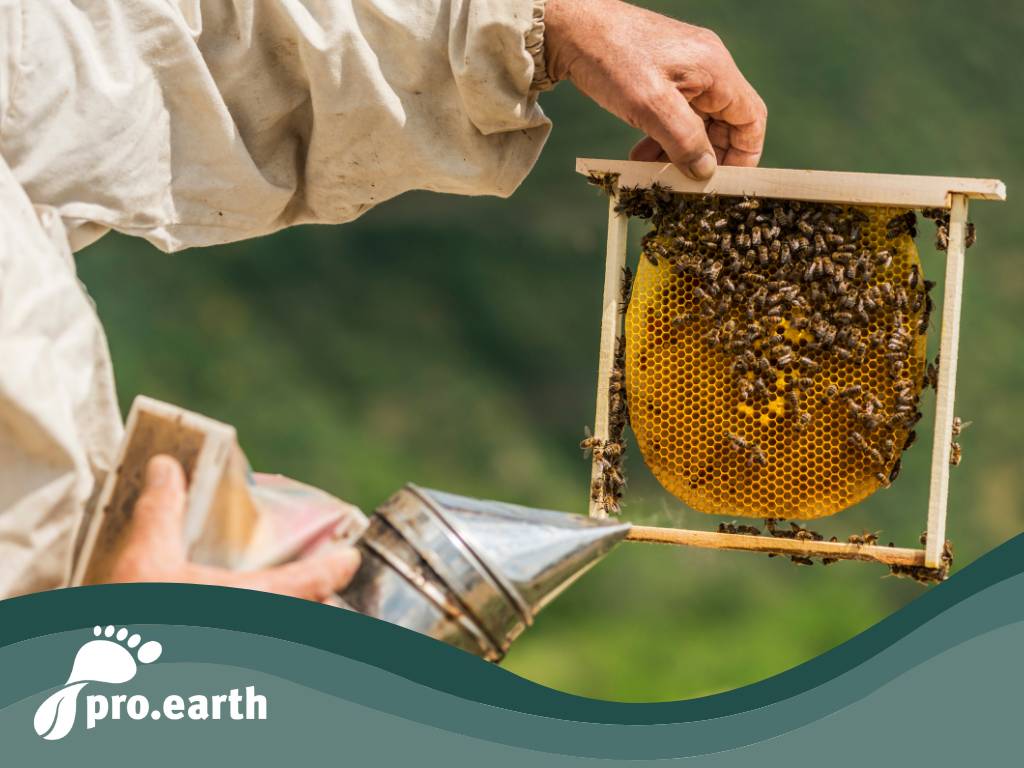Hobby beekeeping is all the rage

Humans and bees have a cultural history dating back thousands of years. And more and more people are taking an interest in beekeeping in their free time. We #Beetschwestern are too, but without the need to keep our own bee colonies right away. We don't have the time or the muse for that at the moment. But friends of ours in Vienna are hobby beekeepers. Full of enthusiasm.
There are over 700 bee species in Austria, one of which is the honey bee.
In principle, anyone can become a hobby beekeeper on their own terrace, garden, roof or balcony. Although you also have to look after bees and should be trained to do so, they require much less attention than, for example, chickens or sheep. And everyone loves it. Honey!
Exciting facts about the honey bee
-
- Number of beekeepers and colonies
In Germany, around 32,000 beekeepers look after around 400,000 bee colonies. The resulting honey covers 44 percent of our needs. The rest has to be imported. More and more honey from laboratories or substitute products is finding its way onto our shelves. Caution is advised here!
https://news.pro.earth/2023/04/18/vorsicht-beim-honigkauf/
-
- Production of 1 kilo of honey
To produce 1 kilo of honey, honeybees have to fly 80,000 to 100,000 kilometers - the equivalent of two and a half to three times around the world.
-
- A bee lives 6 weeks
Each bee produces two teaspoons of honey (2.5 to 3 g) in its approximately 6-week life. This means that 350 to 400 bees have to collect flower nectar and honeydew for six weeks to produce one kilogram of honey.
-
- Honey contains many types of sugar
Our honey consists of 22 different types of sugar, with many biocatalysts, such as minerals, trace elements, vitamins and essential oils
-
- A bee colony comprises approx. 50,000 bees
This can collect around 100 kilos of honey in one season. Humans take a quarter of this (25%), the rest is needed by the bees themselves.
-
- Flight radius of a bee
Bees fly quite far: on average they swarm out three to five kilometers.
-
- Frozen honey
Honey can be frozen and therefore crystallizes later. If you take it out of the freezer again, it becomes creamier.
Is the honeybee a competitor?
We asked ourselves whether or not honey bees would displace the wild bees in our garden and searched the internet for an answer. Opinions differ widely on this subject. Some believe that honey bees are generalists and wild bees are specialists and that coexistence is not a problem, while others believe that competition between the species does arise, especially if there is a lack of suitable forage plants, and that honey bees would drive out other wild species.
We didn't find much study material on the subject. So once again we have to use our common sense. If the environment accessible to wild bees and honeybees has a varied structure and is not contaminated by pesticides, then all species can certainly coexist. This encourages us #Beetschwestern to make our environment as flowering and diverse as possible. Including lots of wild flowers and shrubs.
https://news.pro.earth/2023/05/20/weltbienentag-tierschutz-austria-gibt-tipps-um-bienen-zu-helfen/
In addition to many wild bee species, honey bees have also become increasingly endangered in recent years. On the one hand due to parasites such as the Varroa mite, and on the other due to the use of pesticides and the loss of species-rich habitats.
Beekeeping according to the nature
We also stumbled across this term during our research and would like to explain it in more detail here. Probably because this type of beekeeping suits us very well. This type of beekeeping is strongly oriented towards the natural needs of the bee colony. This includes reproduction via the swarm instinct (which is normally suppressed in beekeeping), maintaining the integrity of the brood nest and natural honeycomb construction.
Further links
How do I become a beekeeper in Austria?
Beekeeping according to nature






